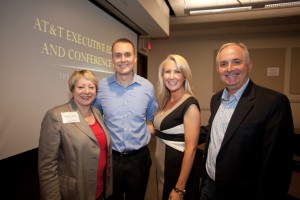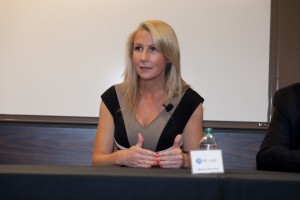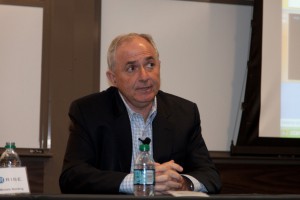
Laura Kilcrease, Brett Hurt, Michele Skelding and Rick Timmins Photo by ©2013, Scott Van Osdol, www.vanosdol.com
By LAURA LOREK
Founder of Silicon Hills News
Austin has one of the nation’s most active angel networks through the Central Texas Angel Network, known as CTAN.
Last year, CTAN, with 100 members, invested about $8 million in 28 companies, including 13 new companies and 15 portfolio companies.
Every angel investor is doing it because they are passionate, said Michele Skelding, a CTAN member and angel investor.
She spoke at the RISE Lunch & Learn panel Tuesday on Angel & VC Funding at the AT&T Executive Education and Conference Center in Austin.

Michele Skelding photo by ©2013, Scott Van Osdol, www.vanosdol.com
Laura Kilcrease, UT McCombs Entrepreneur-in-Residence, moderated the panel, which included Skelding, Brett Hurt, a serial entrepreneur who has founded five companies and is now an angel investor and Rick Timmins, member of CTAN.
Throughout an hour long discussion, the panelists talked about a wide range of topics including what they look for when deciding to make an investment to tips on how to talk to a potential investor.
A startup must have five critical ingredients to build a successful company, said Hurt. He details them on
his blog Lucky7.io. They are a solid business plan, a good team, the proper mindset, funding and culture.
While Hurt, 41, spent the first half of his life building companies, he plans to spend the second half helping entrepreneurs make an impact on Austin. His focus is on ideas that can become big businesses. Hurt co-founded
Bazaarvoice which is now a $540 million company.

Laura Kilcrease and Brett Hurt photo by ©2013, Scott Van Osdol, www.vanosdol.com
Hurt has met with 200 entrepreneurs in the last six and he says there are people thinking big in Austin and some of them are thinking really big.
“There are some people who are thinking too big,” he said.
He’s only interested in working with companies that have products like Bazaarvoice and HomeAway. The one difference is if he has his Angel hat on he will make an investment in something different like Deep Eddy Vodka. He actually met Clayton Christopher, the founder of Deep Eddy Vodka, through RISE.
“I’m a huge, huge fan of RISE,” Hurt said. “This is one of the best things the city has going.”
If he makes an investment in a company like Deep Eddy and he gets back three times his investment then that’s just fine, he said.
But normally, he wants to see companies that have a clear path to get to $100 million in revenue or $1 billion in revenue.
“Most of the things I see are not close to that,” he said. “Lifestyle businesses are just fine. I’m a think big guy.”
When it comes to writing a check, Timmins looks at four things. The most important thing is the entrepreneur, he said. He looks for leadership qualities, managing skills, the ability to take advice and listening skills.
“It’s about the person or the people running the company,” he said. “Fifty percent of what I look at when I decide to invest is about the entrepreneur…If there are any doubts in my mind, I don’t do it.”
His second criterion for investment is the company’s technology and whether it’s disruptive enough. He’ll often consult experts to help him assess that.
The third thing he looks at is a customer.
“All you need for me to believe this is one paying customer who believes in what you’re doing and what you’re trying to establish,” he said. “The last thing I look at is the business plan.”
The business plan makes up just 10 percent of his decision making process.
“I don’t believe business plans anymore,” he said. “But I want you to go through the exercise…I want you to go through the process of thinking through it.”
As a venture capitalist, Kilcrease looks at two key aspects: the jockey and the team, she said.
“We know the business plan is wrong but it’s giving us an idea of what you’re thinking,” she said. “The next thing I look at is the market.”
The average angel investment is around $275,000 and the average venture capital round is $2 million to $3 million.
“I think the jockey and the market is key,” Kilcrease said. “The very last thing I look at is the technology. An “A team” will be able to rework the technology to the market or pivot as they go along.”
In addition to VCs and Angels, now investors are starting to see a third category called the Super Angel who is funding the gap between seed stage and Series A funding for startups, Kilcrease said. And another funding source is syndication between angel networks across the country, which can provide funding in the $1 million to $3 million range, she said.
“Don’t just think about angels as a $50,000 check,” she said.
Mentorship that a company gets is more important than the amount of money they receive, Hurt said.
“A business needs capital and mentorship,” he said. “It’s like a marriage. You can take money from angels and it can be your worst nightmare. It’s got to be the right fit.”
CTAN has five funding cycles through the year, said Skelding. And CTAN added office hours as a more informal way to get to know the angel investors and for entrepreneurs to discuss their ideas, she said. One big mistake entrepreneurs make is that they are just not prepared to pitch to investors.
“You’ve got to learn how to speak to an investor,” Skelding said. “They’ve seen thousands of deals.”
Entrepreneurs need to serve up their ideas in a way that is quick and interesting, she said.
Angels will invest in any type of businesses, Kilcrease said.
“If you get the right angel there’s almost no area they won’t consider,” she said. Whereas, VCs have specialized areas they invest in, she said.
Since 2009, Timmins has invested in 24 companies and only one has a chance to be public, he said.
In response to a question about the single biggest mistake people make in their pitch, Hurt said that entrepreneurs go into the VC or Angel pitch and they show a hockey stick growth slide that they don’t believe in.
“Set expectations you think you can meet,” he said.

Rick Timmins photo by ©2013, Scott Van Osdol, www.vanosdol.com
Timmins echoed that sentiment saying that entrepreneurs need to set realistic expectations and achieve them.
“If you don’t want the pressure of being accountable then be like my parents and don’t ever raise money,” Hurt said. His dad created a halogen fishing light but turned down an offer from Wal-Mart because he wanted to keep his business simple.
Another audience member asked about when to take additional funding for her business.
“Only take the amount of money that will add value to get you to the next level,” Kilcrease said.
![]() While most iOS app developers want to incorporate social media in on their new apps, the process is easier said than done. Facebook, Twitter and other platforms often have their own code – which developers may or may not be familiar with. That’s where SocialREST comes in.
While most iOS app developers want to incorporate social media in on their new apps, the process is easier said than done. Facebook, Twitter and other platforms often have their own code – which developers may or may not be familiar with. That’s where SocialREST comes in.
